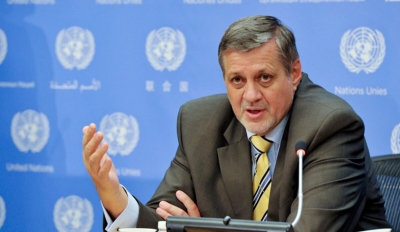Security Council approves technical rollover for mandate of UN mission in Libya
By IANS | Published: April 30, 2022 04:27 AM2022-04-30T04:27:02+5:302022-04-30T04:45:07+5:30
United Nations, April 30 The Security Council has approved yet another "technical rollover" for the mandate of the ...

Security Council approves technical rollover for mandate of UN mission in Libya
United Nations, April 30 The Security Council has approved yet another "technical rollover" for the mandate of the UN Support Mission in Libya (UNSMIL) as council members could not find consensus on a substantive mandate renewal.
Resolution 2629, which was unanimously approved by the 15-member council on Friday, decides to extend the mandate of UNSMIL for three months, till July 31, 2022.
The resolution says UNSMIL should be led by a Tripoli-based special representative of the UN Secretary-General and urges the latter to appoint a special representative promptly, Xinhua news agency reported.
The resolution also shortens the Secretary-General's reporting cycle on UNSMIL's activities to the Security Council from every 60 days to 30 days.
The resolution calls on all parties to refrain from any actions that could undermine the political process or the October 23, 2020, ceasefire in Libya.
It emphasises that there can be no military solution in Libya and demands full compliance by all member states with the arms embargo.
Resolution 2629 is the fourth technical renewal of UNSMIL's mandate since September 2021.
UN Secretary-General Antonio Guterres's special envoy for Libya, Jan Kubis, resigned in November 2021, one month before Libyan national elections were to be held.
In December 2021, Guterres appointed Stephanie Williams of the US as his special adviser on Libya. Although technically not a successor to Kubis, Williams was made to lead the work of the United Nations in Libya.
Libyan parliamentary and presidential elections, which had been scheduled for December 24, 2021, did not materialise.
Libya is currently at a political impasse.
The House of Representatives withdrew confidence from Prime Minister Abdul-Hamid Dbeibah's Government of National Unity and voted on March 1, 2022, to install a new government led by Fathi Bashagha.
Dbeibah has rejected the legitimacy of the March 1 vote and said he would only transfer power to an elected government.
Bashagha has since sworn in a new cabinet, which held its first meeting on April 21.
Disclaimer: This post has been auto-published from an agency feed without any modifications to the text and has not been reviewed by an editor
Open in app